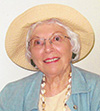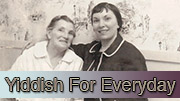October 2012
Yiddish speaking friends listen “up”, and let’s speak a little.
Not a literary Yiddish, but a common every day one:
[whohit]What My Clever Mother Used To Say[/whohit]
1. Geh nisht mit shlechteh chaverim. (Don’t associate with bad friends.)
2. Ess ah bisseleh nor zaul daus zein eppes goot. (Eat a small amount but be sure it is something special.)
3. Zeye nisht farnotisht. (Don’t be a fanatic!)
4. Vaus der mensch lehrent zich aus gait nisht farloren. (Whatever a person learns never gets lost.)
5. Ah mol iz besser ahz meh shvaikt. (Sometimes the best answer is none at all.)
6. Ahz meh lehpt der lehpt mehn. (If you live long enough everything will happen.)
7. Der mensch dahf zach tzoo grayten tzoom shtarben, nor meh darf nisht varten. Ahz der malach ahmauvess haut dein kvitel vet err deer gehfinen. (We should prepare ourselves for the inevitable death, but don’t sit around waiting for it to happen. When the angel of death has your ticket, he will find you wherever you are.)
8. Ah zay vee meh lept ahzay shtarpt mehn. (The way you live your life is the way you die.)
9. Ahz meh kaucht shane, macht mehn ah bissel mere effshare veht imehtzer kumen. (When you’re already cooking, cook a bit more – never can tell when someone might drop in.)
10. Ah mol iz besser ahz meh hert nisht ah zay goot. [On her deafness] (Some things are better not heard.)
Hert zach tzoo Yiddishe frient, dee mahme vil eich zaugen nauch ah por verter.
(Listen up Yiddish friends, my mother has a few more words for you.)
11) Mitt ayn tauchess ken men nischt tansen auf tzveh chasehness. (Since you only have one behind, you can’t dance at two weddings at the same time.)
12) Ahz meh vil dem maulzeit orentlich halten dahf menem in tzveh tzoohsch palten. (If you want to be fair, sometimes you have to divide the portions.)
13) Ahz meh grate nischt aun erev Shabbas, haut men nischt auf Shabbas. (If you don’t prepare ahead as in the case of Shabbas, on Shabbas it’s too late.)
14) Far altz coomt ah-tzeit. (Everything in its own time.)
15) Farnem zich dee hent vet zein shtil dee kaup. (Busy your hands and your head will be quiet.)
16) Altz in aynem iz nischt tau by kaynem. (In life, no one has it all.)
On the passing of our youngest sister who had been ill for many years, my mother comforted us with these words:
17) Gaut vase vauserr toot. (G-d knows what’s best.)
18) Gelt feart dos velt. (Money rules the world.)
On marriage, mother had this advice for her five daughters:
19) Cook nischt far shanekeit auder reichkeit, cook far menschlichkeit. (In a husband, don’t look for beauty or riches, look for good character.)
In the spring when the trees and flowers started to blossom she would comment:
(Everything returns from the earth except man.)
Yiddish for Everyday
Henya Chaiet is the Yiddish name for Mrs. A. Helen Feinn. Born in 1924 ten days before Passover, her parents had come to America one year prior. They spoke only Yiddish at home so that is all she spoke until age five when she started kindergarten. She then learned English, but has always loved Yiddish and speaks it whenever possible. Chaiet lived in La Porte and Michigan City, Ind., from 1952 to 1978 and currently resides in Walnut Creek, Calif. Email: afeinn87@gmail.com







